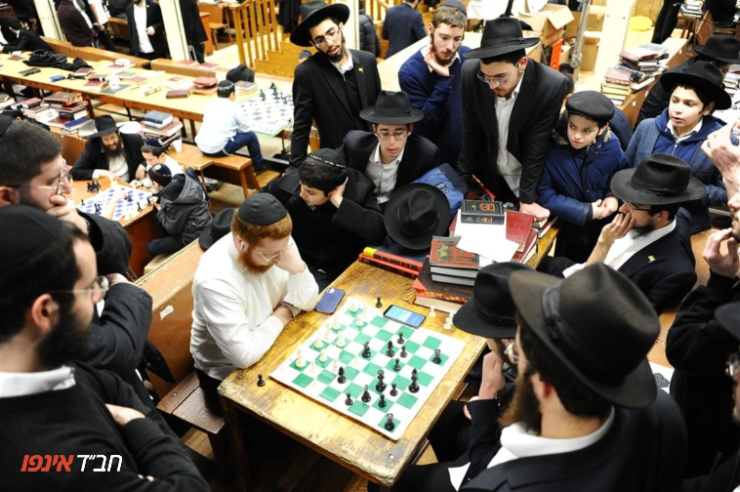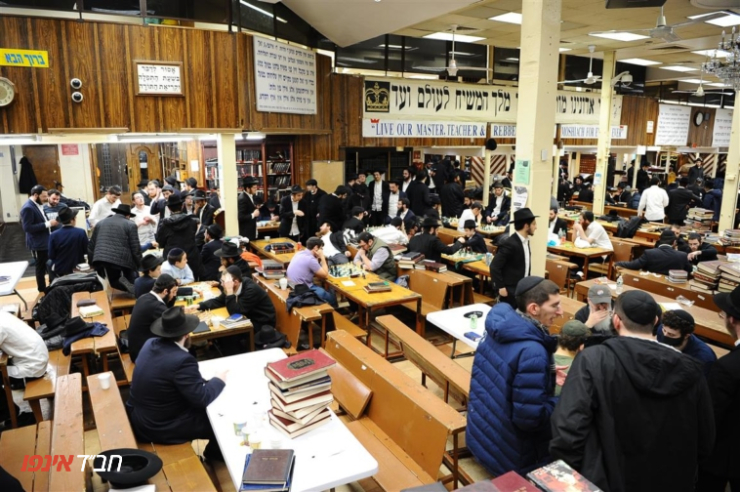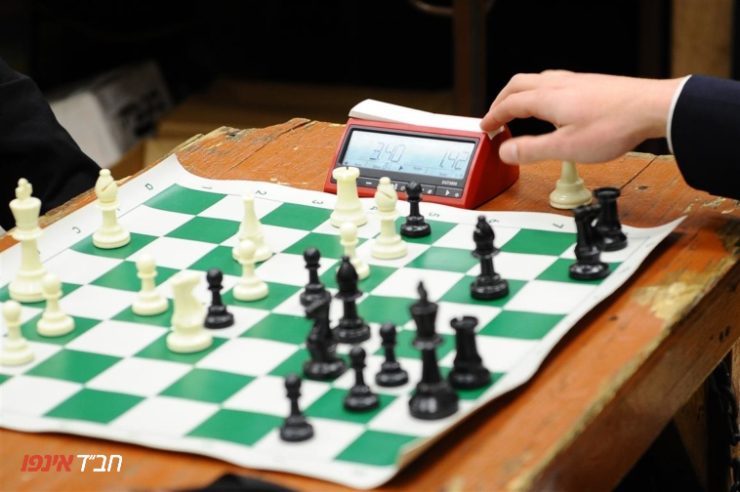More Than Chess: The History and Meaning of “Nittel Nacht”
On the night between December 24 and 25, “Nittel Nacht” is observed by many Jewish communities originating from Eastern Europe and Hungary. The main custom is to avoid Torah study from sunset to midnight. What is the meaning of the word “nittel,” and according to which calendar is its date determined? Why don’t we study Torah on this night, and how is it possible that Torah can add chayus to the kelipos? Why do we play Chess on Nittel? What else is recommended to do on this night? Is it true that one may learn Chassidus on this night? A fascinating compilation of sources, minhagim and explanations on this unique minhag by Rabbi Zalman Hertzel from a forthcoming book on Jewish customs • Full Article
By Rabbi Shneur Zalman Hertzl, Beis Moshiach Magazine
Photos: Shneur Reinitz, Avreimke Eisinshtien/Chabadinfo
In the Rebbe’s teachings there are three ways of explaining the name Nittel, which also explains the variations in spelling of the word (with a tes or a tav):
1-Nittel is a reference to removal, absence. Oso Ha’ish (Yoshka) caused an absence in matters of holiness and Judaism, both in his behavior in his lifetime as well as what he caused afterward, to the point of a lack and absence of Torah study throughout the world every year on the night of Nittel (and this is aside from the physical suffering he caused to Jews throughout the generations, etc.).
2-Nittel from the root meaning to hang, since in the end he was hanged. It should be noted that the Bnei Yissoschor wrote about Nittel that it is “a night when he was taken and uprooted from the world,” i.e. he was hanged on this date.
3-Nittel from the Latin root meaning birth, because it is the birthday of Oso Ha’ish. (According to this, January 1 is the day of his bris.)
Some add that the custom not to learn Torah on this night is alluded to in the word Nittel which is an acronym for “Nisht Yidden toren lernen.”
WHEN IS NITTEL NACHT?
The night between the 24th and the 25th of December is Nittel. Others hold that January 7, the night between the 6th and 7th, is Nittel. The two dates came about because of the two secular calendars, the Julian Calendar and the Gregorian Calendar. Some hold the earlier Nittel and some hold the later, and some observe Nittel on both of those nights.

WHAT SHOULD BE DONE?
The Rebbe writes that as opposed to some who stick to one date, one should actually observe whichever date the Christians observe in any particular country. As the Rebbe wrote in a letter of 29 Iyar 5716, “One can say that since Nittel is an exception in that its date is not according to the calculation of the Jewish people but according to the calculation of the nations of the world, therefore we take into account the calculation of the nations of the world that is customary specifically in that place. It has also been said in the name of my father-in-law, the Rebbe [Rayatz], that in America he said to observe the aforementioned custom according to the calculation of the country here [the night of December 25th].”
He wrote along these lines to my grandfather, R’ Pinchas Leibush Hertzl in a letter dated 13 Shevat 5717, where he added that if the country had different customs, to do as the majority. “It seems to me that in every country they conduct themselves regarding the above according to the calendar of the non-Jews of their country. And if they have different customs among them, to observe the above on the night that most non-Jews celebrate it, i.e. the night accepted by most non-Jews, since the rule of following the majority applies to non-Jews as well…”
It’s interesting to note that although the date of Nittel has to do with the secular calendar, we find a connection to our calendar too. The Rebbe writes, “To point out that some say that the fast of 9 Teves (Megillas Taanis at the end) is because he was born then… and if so, then the above is so also according to the Jewish calendar.”
WHY DON’T WE LEARN TORAH ON THIS NIGHT?
1-In the Taamei HaMinhagim it says: Because in the early days, enemies of the Jews would ambush them and strike them on this night, those whom they found outside or on the street, cruel blows, and sometimes it would even kill them, with the masses thinking this was a good deed. Therefore, the gedolei ha’dor decreed that the talmidim and bnei ha’yeshivos stay put and sit in their homes on this night, and not be out on the streets.
According to this explanation, it turns out that it’s a technical matter (with no connection to the significance of this time). It was simply dangerous to go to the Beis Medrash.
2-The Korban Nesanel writes that the reason Torah study is forbidden on Nittel Nacht is because of aveilus, that Oso Ha’ish was born. “This night is like the day the Beis HaMikdash was destroyed, and this is why it is forbidden to learn, like on Tisha B’Av.”

3-The Bnei Yissoschor writes, “Another reason we refrain from learning… is because he was killed on this night and his name was Yeshu which is the kelipa of the ‘raven.’ His name is alluded to in the Torah, ‘v’nokev shem yud (Hashem)’ which is the acronym of Yeshu… and we heard from true accounts that a number of times on the night that he was removed and uprooted from the world, that they learned on this night and a dog came into their house, and minhag Yisrael is Torah.”
This reason is more substantive – on this night, there is a power surge in the forces of kelipa because he was killed on this night. The root of Oso Ha’ish is from the kelipos of the raven and the dog, so much so that a dog came to the houses of those that learned on this night. This shows the desire of kelipa to imbibe from the holiness.
4-The Rebbe writes in the HaYom Yom for 17 Teves (in the name of the Rebbe Rayatz), “The reason for not studying Torah on Nittel-night, I heard from my father, is to avoid adding vitality.”
In Likutei Sichos, the Rebbe elaborates, “The meaning of avoiding adding vitality refers to him and those who follow him now.” He adds, “Since his belief system and their day of celebration is according to their calendar, and that is when they celebrate etc, therefore, the bittul Torah is also on this night.”
The Rebbe continues (and also mentions the reason mentioned before), “And it should be added that since in the Middle Ages there was (another ) reason because of danger, that on the night of their celebration they would lie in wait for Jews on the streets and beat them, which is why they decreed not to go to the yeshivos etc. – it’s sufficient that bittul Torah be one night only (and only until midnight).”
What can be seen from the Rebbe’s words is that the real reason is (not only technical, that it was dangerous to walk around outside but) not to add energy to Oso Ha’ish and those who follow his approach now. Since this date is celebrated according to the secular calendar, the bittul Torah too, is at the time of their celebration – at night, and only until midnight. It was along these lines that the Rebbe wrote to my grandfather that “since the inyan of bittul Torah is a big chiddush, therefore we don’t take from it anything beyond its chiddush, which is why one should not refrain [from learning] beyond one night only.”
CAN TORAH ADD CHAYUS TO KELIPA?
1) The Rebbe responded to a similar question as follows:
“Regarding what you write… how is it possible that Torah study will cause undesirable results and even worse? There are other examples and in Nigleh too, like the study of most of Torah on Tisha B’Av, learning most of Torah by a mourner, r’l. The learning of Torah by one about whom it says, ‘and to the wicked one G-d said, how dare you recite My statutes.’ Also see the Alter Rebbe’s halachos of Talmud Torah, chapter 4, seif 3, and in Kuntrus Acharon.”
In other words, yes, something undesirable can result from a holy thing if it is done at the wrong time (or in the wrong way). This appears in Nigleh of Torah too; it is not just according to pnimiyus.
2) Another question that can be asked is, the world exists in the merit of Torah study, so how does the world exist on Nittel Nacht when Torah isn’t studied?
This question is not that difficult, since Jews live all over the world and where they refrain from learning in one place, at that time, in another location in the world, it’s not Nittel and people are learning.

One Nittel Nacht which fell out on Shabbos, the Chiddushei HaRim of Ger (d. 1866) did not say divrei Torah; he only said that once, a priest asked Rabbi Yonasan Eibeschutz: If the world ‘stands’ on Torah, what does the world stand on at this time, when nobody is learning Torah? He answered: Minhag Yisrael Torah – the very fact that we aren’t learning is Torah, and the world exists on this.
HOW LONG DOES NITTEL LAST?
Nittel begins with sunset (not when the stars come out). In the HaYom Yom for 17 Teves it says [in the name of the Rebbe Rayatz], “My father once said: Those diligent students who begrudge those eight hours and cannot tear themselves away from study – I am not fond of them. This (abstaining from study) applies only until midnight.”
Therefore, remember to finish the shiurim of Chitas and Rambam before sunset.
WHERE DOES NITTEL NOT APPLY?
The Rebbe writes in Likutei Sichos, “The Jews who live in Arab lands do not have this custom.” The reason is because it depends on whether this avoda zara exists in that place. In a sicha of 20 Kislev 5737, the Rebbe explained:
Regarding Nittel which will be soon, for the Sefardim it doesn’t exist. I once spoke with a Sefardic Jew about Nittel and he knew nothing about it. Since it has to do with Oso Ha’ish, in the countries which are Christian there were all the limitations of Nittel, to the extent of ‘abolish Your Torah,’ that they did not learn until midnight, as explained in a number of places, until this became a Jewish minhag, ‘minhag Yisrael Torah.’
This is because of the avoda zara in Christian countries. Therefore, one needs to beware of a nourishment of the other side, since he had a connection to Torah as explained in the history books and the Gemara and in a number of places; whereas in Moslem countries where they are not connected to Christianity, like Morocco and Yemen, this minhag doesn’t exist at all and it is undoubtedly permissible to study Torah, because since Oso Ha’ish had no control there, there is no concern for providing nourishment.
One can’t ask, if we are afraid of giving nourishment to the other side, how can they learn in Moslem countries? Because it follows the same rules as avoda zara, and in a certain place if it is not an inyan of avoda zara, there is no reason to beware of this.
In a letter from 29 Iyar 5716, the Rebbe writes, “Regarding what he heard that in the Holy Land… this is not done at all (and surely you heard this from someone very reliable) – if the report is true, perhaps the reason can be given that since (aside from short periods) Ishmaelite rule was prevalent there, and it depends on the angel up above, there wasn’t the inyan of Nittel there to begin with, and consequently there is no concern about adding chayus. Based on this, it fits nicely with the idea that in every country it needs to be according to the way the nations of the world of that country do things.”
It should be pointed out the Rebbe does not issue a decision in this letter to follow the word-of-mouth tradition regarding Eretz Yisrael, and to the contrary, based on the sicha cited above it would seem that since in the Eretz Yisrael today there are celebrations (and idolatrous practices) carried out on this date, we should observe the customs pertaining to Nittel. In fact, that is the practice in almost all communities there including Chabad Chassidim.
WHAT SHOULD BE DONE ON NITTEL NACHT?
Until now, we’ve learned that it’s minhag Yisrael not to learn Torah on Nittel Nacht. Now we will discuss what should be done on this night. How should this night be used in the optimal way?
On Shabbos parshas Vayeishev 5750, the Rebbe spoke at length about Nittel and said, quoting the Rebbe Rayatz, that his father, the Rebbe Rashab, would play chess or stand and watch and suggest how to play.
The Rebbe explained the lesson from this story that even at a time which cannot be refined through Torah study, the time should be used beneficially which is why chess is played, a game that contains wisdom and it makes a person sharper so that afterward, he can understand Torah better. It also sanctifies the name of heaven and praise of Israel in the eyes of the nations (who respect the game), seeing that the Jewish people are a ‘wise and discerning nation’ in this wisdom too. Additionally, even as an optional matter, it is beneficial to those for whom that is their livelihood and it is not worse than other forms of earning a livelihood; on the contrary, since it’s a means of livelihood that has wisdom.
The Rebbe concludes that from this there is a lesson and the empowerment regarding the practical issue of how to use the time of Nittel. Not to waste it, ch’v, but to use it in a beneficial way, especially in adding matters of wisdom or adding in tzedaka and chessed, or taking care of matters of running the home or the like.

The Rebbe said: I once heard from a yeshiva student who was missing buttons on his clothes and when they asked him why he didn’t sew on the buttons he said because then he wouldn’t have anything to do on Nittel! To a yeshiva student, to sit idly, is out of the question! Rather, he needs to use the time beneficially including sewing on buttons, so that the right side goes over the left side (as this is the Jewish way).
The Rebbe concluded: From the conduct of the Rebbe [Rashab] an additional matter is added – just knowing of the Rebbe’s conduct on Nittel, will enable one to utilize the time in order to picture the holy countenance of the Rebbe (with his picture that we have, and all the more so for those who saw him) in a way of and “your eyes should see your teachers,” the founder of yeshivas Tomchei Tmimim. This alone (picturing his holy visage) increases love and fear etc. and to behave as he did, to go in his ways and pathways that he guided us.
This idea of picturing the Rebbe is worthy of emphasis, for on the one hand, the Rebbe derives this lesson almost parenthetically – since the Rebbe Rashab played chess, therefore, it is worthwhile to use the time to picture his holy countenance. On the other hand, the utilization of the time and the attendant benefit is enormous, as it increases in the love of Hashem and fear of Hashem. We also know of the many advantages associated with gazing upon “the face of the Rav/Rebbe,” especially for the inyan of strengthening hiskashrus.
Furthermore, this lesson takes on a new dimension in our generation and in our times when we can strengthen the hiskashrus of Chassidim to the Nasi of the generation not only through pictures but also by watching videos, a novelty of our generation.
USING NITTEL IN OTHER WAYS
1) In addition to what was mentioned before, we find in other communities and in the conduct of gedolei Yisrael that they used this night differently. For example, to learn a foreign language, to calculate the household’s income and expenses, calculate money for maaser, etc.
2) It is said that the Rebbe told Rabbi Yosef Wineberg, who gave Tanya classes on the radio, that on Nittel Nacht he should tell stories of the Rebbeim. Similarly, in the yoman of a tamim (9 Teves 5731) it says, “Last Thursday, the Rebbe told Rabbi Chodakov to tell the organizers of the Pegisha with students that on Friday night, since it is Nittel, not to have shiurei Torah; just lectures, stories and the like.”
3) About the Rebbe himself it is said that for some reason, on Nittel Nacht he watched movies taken of Chassidim in Russia during communist rule and sometimes he watched the film of the Yud-Tes Kislev farbrengen that took place in Kfar Chabad.
[In a lighter vein, we can draw a parallel between what the Kedushas Levi points out regarding what Chazal say about what is written in the tefillin that Hashem ‘wears’ (“Who is like Your nation, Yisrael?”), namely that our tefillin contain the praises of Hashem and Hashem’s tefillin contain the praises of the Jewish people. Since “the Tzaddikim are similar to their Creator,” we can say that Chassidim use the time of Nittel to watch the Rebbe and the Rebbe uses the time to watch the Chassidim.]
IS IT PERMISSIBLE TO LEARN CHASSIDUS DURING NITTEL?
The Rebbe writes in his personal diary that the Rebbe Rashab did not learn Chassidus on Nittel Nacht (not even for review), and when it fell out on Friday night, he did not say the maamar on Friday night as was customary, but rather the next morning.
It should be pointed out that in another place in his diary, he writes in the name of his father-in-law [the Rebbe Rayatz]: I heard from the Rebbe [Rashab], as a simple statement of fact, that not learning on Nittel does not apply to the learning of pnimiyus ha’Torah. He also writes there: Whether or not the Tzemach Tzedek learned on Nittel is not known to the public.
In a letter that the Rebbe wrote, dated 27 Shevat 5713, he writes: There is the well known story that we heard from my father-in-law [the Rebbe Rayatz], that once on the night of Nittel, somebody went in to the Tzemach Tzedek and found him learning. He asked him: Rebbe, isn’t it Nittel today? The Tzemach Tzedek answered him: Fool! Who told you to say anything? Despite that, the Tzemach Tzedek closed the sefer and stopped learning.

AROUSE JEWS TO TORAH AND MITZVOS ON NITTEL NACHT
In the year 5750, Nittel Nacht fell out on Sunday night (one day after the sicha on Shabbos parshas Vayeishev cited earlier). When the Rebbe returned from the Ohel (as was his practice then to go every Sunday), the Rebbe said a short sicha after Maariv, the third night of Chanuka (when it was already Nittel).
In this sicha, the Rebbe urged about the minhag to give Chanuka gelt etc, and during the course of the sicha the Rebbe cited a few pesukim and maamarei Chazal.
What we can likely infer from this “maaseh rav” is that the prohibition regarding learning applies to opening a Torah sefer (Chumash, Mishnayos, Gemara etc) and sitting down to learn, or to listen to a Torah class and the like. However, when it comes to arousing Jews to fulfill Torah and mitzvos or a minhag Yisrael, this is not prohibited on this night, even if involves mentioning in passing a passuk or maamar Chazal.
It’s also obvious that in years when it falls out on Chanuka, its a suitable time to be involved in Chanuka mivtzaim (and in Hakhel when applicable).
1887
Join ChabadInfo's News Roundup and alerts for the HOTTEST Chabad news and updates!








































What about saying Tehillim? Generally, women may recite tehillim at night.